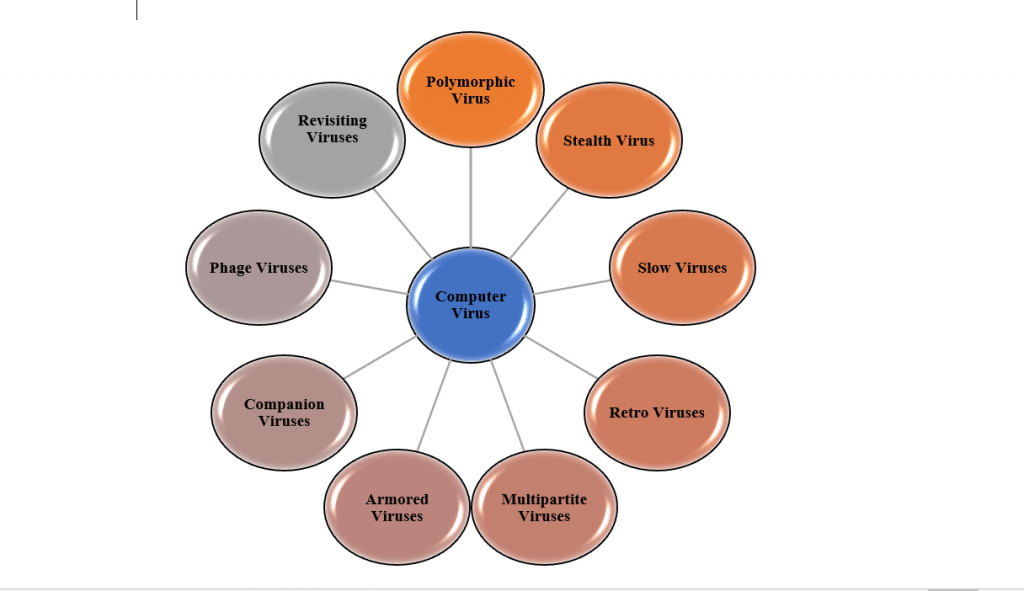A computer virus is a computer program or code that can replicate itself and spread from one computer system to another system. A computer virus has the capacity to corrupt or to delete data on your computer and it can utilise an e-mail program to spread the virus to other computer systems. In the worst case scenario, it can even delete everything on your hard disk. The purpose of it is to disrupt the operation of the computer or the program.
Various types of viruses-

- Polymorphic Viruses
A polymorphic virus is an encrypted virus that hides itself from anti-virus through encrypted (scrambled) data and then decrypts itself to be able to spread through the computer. The thing that makes it hard for anti-virus software to detect polymorphic viruses is that the virus generates an entirely new Decryption routine each time it inserts a new executable file, making the virus signature different in each signature.
- Stealth Viruses
A Stealth virus hides the modifications made to files and boot records by modifying and forging the results of calls to functions, therefore programs believe they are reading the original file and not the modified file. A good anti-virus software will probably detect a stealth virus due to the fact that a stealth virus attempts to hide itself in memory when an antivirus software is launched.
- Slow Viruses
A Slow virus is a difficult virus to detect due to the fact it only modifies and infects files when they have been modified or copied. Therefore the original file will not be infected by the actual copied file. A good way to protect yourself against slow viruses is by using an integrity checker or shell.
- Retro Viruses
A Retro virus attacks the anti-virus software designed to delete it. The retro virus usually attempts to attack the anti-virus data files such as the virus signature store which disables the ability of the anti-virus software to detect and delete viruses. Otherwise, the retro virus attempts to alter the operation of the anti-virus software.
- Multipartite Viruses
A Multipartite virus attempts to attack and infect both the boot sector and executable files at the same time.
- Armored Viruses
An Armored virus attempts to protect itself from anti-virus software by trying to make anti-virus software believe it is located somewhere else. Therefore the Armored virus has made itself more difficult to trace, disassemble and understand.
- Companion Viruses
A Companion virus creates a companion file for each executable file the virus infects. Therefore a companion virus may save itself as scandisk.com and every time a user executes scan disk.exe, the computer will load scandisk.com and therefore infect the system.
- Phage Viruses
A Phage virus is a very destructive virus that re-writes an executable program with its own code, rather than just attaching itself to a file. Therefore, a Phage virus will usually attempt to delete or destroy every program it infects.
- Revisiting Viruses
A Revisiting virus is a worm virus and attempts to copy itself within the computer’s memory and then copy itself to another linked computer using TCP/IP protocols. The Morris Worm virus in the late 1980’s was the first major virus threat to hit the Internet.
Advantages of Virus in Computers
The usefulness of a computer virus from the host’s point of view, computer viruses are nothing but annoying programs capable of doing some serious damage to a computer network.
However, there’s a good reason why people spend so much of their time developing these rather complicated and very malicious programs:
- A virus can be a way for a hacker or programmer to show off his ability. Some firms even hire ex-hackers to create virus protection and other types of software.
- A computer virus can be used to steal people’s personal information. Although illegal, this can be very useful and profitable for those stealing and then selling on or using the information gained in this way.
- A virus is able to take control of a person’s computer.
- Online advertising is often targeted by hackers, who make honey from virus-related scams (lor example click jacking’)
- Computer viruses are considered an important part of technological warfare. For example, Iran has accused several countries of targeting (and successfully shutting down) their illegal nuclear facilities, using computer viruses.
Disadvantages of Virus in Computers:
Computer viruses have a variety of disadvantages, some of which are discussed below:
Loss of Software Functionality
When a virus infects your computer, it is highly likely it will alter your system so that you will no longer be unable to access certain functionality. It is quite possible that you will no longer be able to install anti-virus software, even if you already have it installed.
It is likely that the virus will prevent any program from detecting and removing the infection it has caused. Naturally, the creators of the virus don’t want you to be able to get rid of it.
Exploitation
Some computer viruses are created by Internet criminals seeking to make money out of people. The virus is likely to display messages stating there is a problem with the computer, and suggest that this can be fixed by providing a payment to a repair company.
Of course, in reality this ‘company’ is operated by the criminals and the payment will not rid the software of the virus – or if it does, then this will be because there was never a real problem in the first place.



